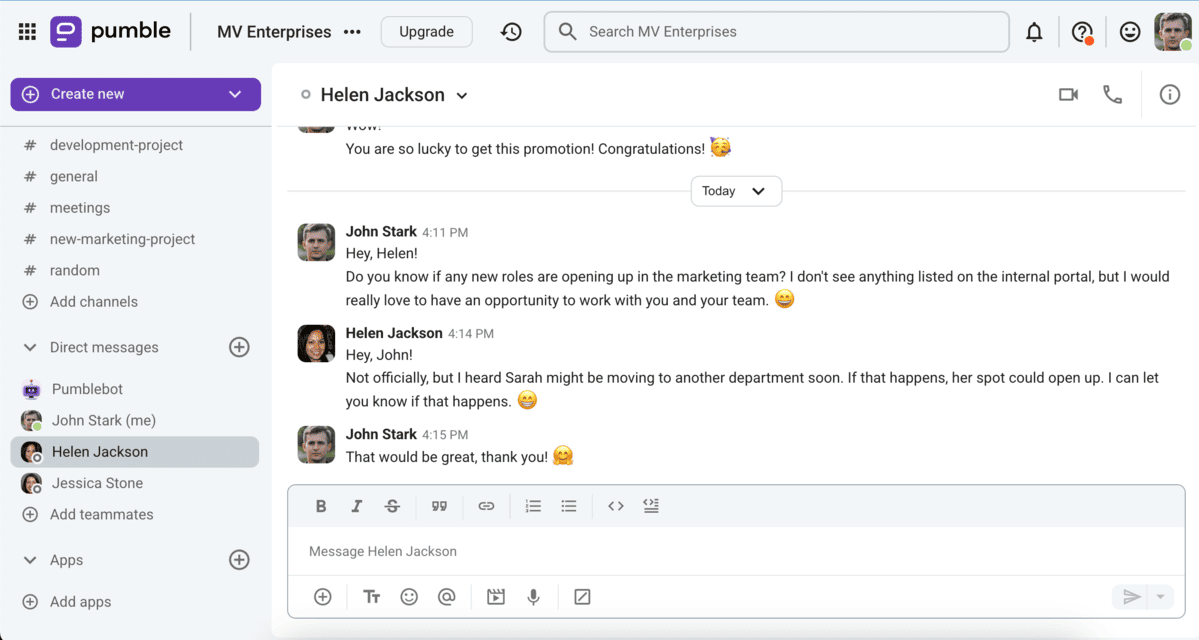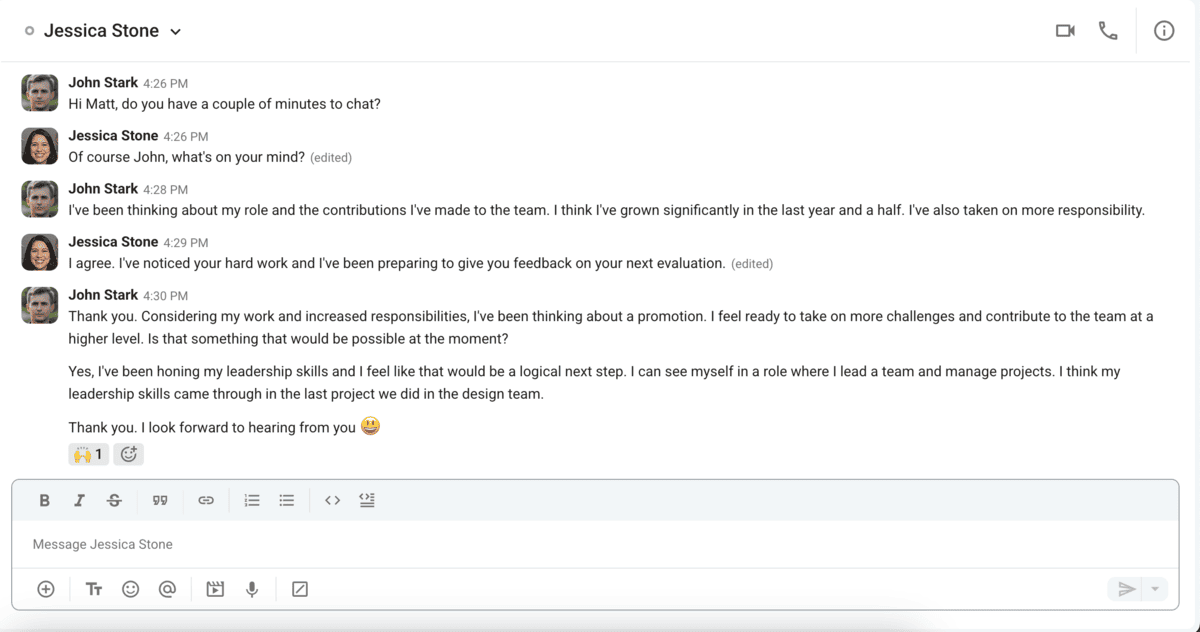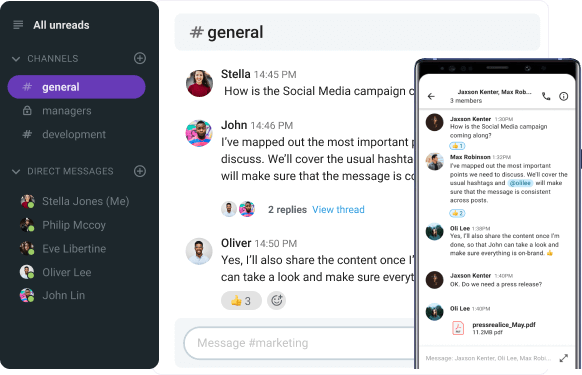You’ve been working hard, delivering results, and leveling up your skills — and now you’re wondering if it’s time for the next step.
Asking for a promotion can feel intimidating, but it’s also one of the most important career moves you can make. It takes the right mix of preparation, timing, and confidence to advocate for yourself and show why you’re ready to move forward.
In this post, we’ll walk you through how to ask your manager for a promotion, including:
- When is the right time to ask,
- How to approach the conversation,
- Tips for building a strong case,
- Common mistakes to avoid, and
- Sample scripts you can use.
If you’re ready to move up, we’ll help you make the ask — and make it count.
Let’s start!

Table of Contents
When to ask for a promotion?
We talked to Becca Carnahan, Career Coach and Founder, about the right time to ask for a promotion. She says the right time varies, but key questions to consider include:

“How have my accomplishments benefited the business in the past 6 months/year?
What accomplishments can I point to that are above and beyond my current job description?
What key skills and experiences would make me successful in the next level role?”
There’s no perfect moment — but some situations signal it’s time:
- You’re ready for more responsibility — You’ve mastered your current role and are eager for new challenges. You understand what the next step involves and feel prepared to take it on.
- Your role has grown beyond the original scope — Your current work doesn’t match your job description, and you’re regularly handling tasks from a higher-level role.
- You’re consistently exceeding expectations — You’ve hit your goals, earned strong feedback, and grown in your role. These wins build a strong case for moving up.
Promotions don’t just reflect tenure — they reflect impact. Make sure your timing matches your contribution.
💡 Pumble Pro Tip
Job descriptions are not meant to be followed to a T, and, naturally, you will sometimes do tasks outside of your job description. But sometimes, you need to set boundaries and draw the line of what you’re willing to do. Take a look at our article to find out more about professional ways to say “That’s not my job”:
7 Tips on how to ask for a promotion
You’ve now established that you’re ready to ask your boss for a promotion. But how do you do that professionally and politely?
Let’s go over some tips that will help you prepare for your upcoming conversation about a promotion.
Tip #1: Research the position
Before asking for a promotion, make sure you fully understand the duties and responsibilities you will be taking on in the new position and that you are ready for them.
If your company has a job listing online, carefully read all of the information in the ad. Consider the additional responsibilities, benefits, and workload.
Ask yourself if you see yourself in this position and whether it’s the right job for you. Introspection is important, according to Becca Carnahan:

“Ask yourself: ‘Do I want the next level role?’
We often think that we should be climbing the corporate ladder, but it’s very important to think about the skills you enjoy using and the environments in which you thrive. Make sure you are advocating for the right job, not just the next job.”
Additionally, if an employee is leaving and their position is being left vacant, talk to them about their role and the skills and experience needed for it. They can even help you out during your interviewing process or write a letter of recommendation.
Finally, research the job online to get a better idea of the job market and what the expectations are.
For example, you may be asked what compensation you’re looking for in the new position. Be prepared to support your opinions with facts and figures.
Tip #2: Research available positions within the company
You’ve tried looking up current available positions within your company, but nothing relevant comes up. Does that mean you should give up for the time being?
Not necessarily.
The path to career advancement is not always clear. Employees quitting, retiring, being fired, or being promoted can all lead to a vacant position. However, this is not always predictable and can come at short notice.
Speaking to others in the company and asking around about job opportunities can prepare you for a job opening before it becomes official. Water cooler talk, or grapevine communication, can sometimes provide useful information.

Tip #3: Talk to your manager before a position opens up
Before scheduling a formal meeting where you pitch your idea for a promotion, it may be useful to informally talk to your manager about it.
If your company culture and relationship with your manager allow it, you can bring up the subject of promotion in an informal setting.
For example, you can start the conversation by asking your manager about the growth opportunities for your position while chatting in the office. Or, you can suggest increased responsibilities, such as coaching new team members when they join the team.
Furthermore, during your performance reviews, let your manager know that you are open to growth opportunities in the future.
These conversations will help you determine whether your manager sees you as a good fit for a promotion and what you can expect when an opportunity lines up.
Tip #4: Choose the right time to ask
We’ve already established a couple of situations where you may feel it’s time for a promotion. However, it’s a good idea to also take a look at the current state of your company before asking for a promotion.
If your company is going through a crisis and has to lay off employees, it may not be the ideal time to ask for a promotion.
Conversely, if your company’s profits have been on an upward trajectory for the last year, you can safely assume that a promotion is within budget.
Furthermore, if your job has you dealing with big clients or making remarkable sales, don’t be afraid to use it to your advantage. For example, if you’ve just made a sale that exceeded expectations, your manager will be more likely to reward you with a promotion.
Tip #5: Prepare your pitch
The key to success is to be prepared, according to Shirley Borg, Head of Human Resources:

“Preparation is key. Research comparable roles within the industry to understand where your current compensation and responsibilities lie. Be prepared to negotiate and clearly express your value proposition.
It can be helpful to role-play the conversation with a mentor or coach to ensure you’re prepared for any potential pushback or questions.”
Therefore, take your time to prepare for the conversation about your promotion.
The conversation should flow smoothly and be informative and professional. To make this happen, you should prepare ahead of time by thinking about or writing down all of your talking points.
The most important aspects you should be highlighting are your achievements and the work you’ve done for the company. Don’t forget to mention specific projects you’ve completed or goals you’ve reached. Also, point out how you can positively impact the company in the new role.
Furthermore, think about all the questions your manager may have for you and prepare your answers. For example, your manager may ask you why you want to change positions and whether you’re satisfied with the current one. Or, they may be interested to know if the different schedules will work for your work-life balance. Consider the avenues your conversation may take you, and be prepared to answer questions.
It’s a great idea to write down your main talking points and practice before your meeting. However, if you would like to have a full pitch to practice with and have in front of you while you’re in the meeting, we have some scripts prepared later on in the text.
Tip #6: Schedule a meeting
When you’ve prepared your talking points and perfected your pitch, you’re ready to get the ball rolling.
A conversation about a promotion is a serious one, so make sure to set aside time for a constructive conversation.
Send a message to your manager asking about the best time to set up a meeting. It can be a virtual meeting or an in-person one.

Make sure you clearly state that your intention is to talk about the possibility of a promotion. This will give your manager enough time to prepare for the conversation. However, keep the introduction message short and talk about the details during the meeting.
Tip #7: Be professional and polite
During the meeting, remember to stay professional and polite.
Get straight to the point and be concise. Deliver your pitch directly and confidently. Your manager will appreciate your confidence and the fact that you know what you want.
However, do be prepared for a dialogue. This isn’t a one-way conversation where you present your pitch and hang up. Your manager will probably have some questions or comments. Remain polite and professional even when confronted with unexpected situations.
Shirley Borg highlights the importance of staying respectful even when faced with rejection:

“Remember, asking for a promotion is a normal part of professional growth. Be honest, direct, and respectful in your approach, and don’t be disheartened if the answer is not what you’d hoped. The discussion itself will show initiative and open the door for future opportunities.”
Scripts for asking for a promotion
Following a script can be beneficial for many people, especially those struggling with confrontation or meeting anxiety. We’ve prepared scripts for various situations that will help you be more confident in your delivery.
They are just the start of your conversation with your manager, so be prepared for questions and further discussions. Still, these scripts will help you get off on the right foot.
General script on how to ask your boss/manager for a promotion
Here’s a general script you can use for pretty much any position and situation — you just need to fill in the specific information:
“Thank you for the opportunity to discuss my career development with you.
I’ve been dedicated to my job and have consistently delivered excellent results, including [specific achievements, goals, or projects]. I’ve learned and grown so much in the last [time period], and I’m ready for the next step.
I would love to challenge myself with the added responsibilities and duties that come with the [desired position]. As it is currently open, I would like to express my interest in filling this role, as I feel that I would thrive in this new position.
My performance reviews have consistently been very positive, and your feedback has helped me grow a lot. So, your opinion really matters to me. What do you think about this idea?”
Script on how to ask for a promotion and a raise
If you need a script on how to ask for a promotion and a raise at the same time, we have one for you:
“I appreciate you taking the time to talk to me about my career growth and professional development.
I wanted to start by saying I’ve thoroughly enjoyed my time working here, and I remain committed to the success of our company.
Lately, I’ve been thinking about advancing my career and taking the next steps. For the last [period of time], I’ve gladly taken on additional responsibilities. It’s been challenging but rewarding seeing how I deal with leadership situations and increased duties. My role in the [successful project] is an example of my growing skills and experience, and how I’ve positively impacted the company.
I would like to discuss a promotion and a raise with you. I believe my recent work reflects that I’m ready for more.
What are your thoughts on this idea?”
Script on how to ask for a promotion without asking
If you’re not sure how direct communication will be received, we’ve prepared a compelling but indirect script that doesn’t use the word “promotion”:
“Thank you for taking the time to talk with me today. I wanted to discuss my career path at [company name].
I’ve been working here for [time period], and I’ve enjoyed my time here. I appreciate the learning opportunities and feel attached to the company’s values and goals.
In the past [time period], I’ve taken on increased responsibilities, such as [specific responsibilities]. I’ve also had success in all of my projects, most notably [specific projects].
I would love the opportunity to grow even further and expand my skills and experience. I value your insight, so any guidance you can offer on how I can further expand my career is welcome.”
Script on how to ask for a promotion in an email
Here’s a longer script that you can use as an email template if you’re planning to ask for a promotion over email:
Subject: A conversation about career growth
“Hello, [Supervisor’s name],
I hope you’re doing well. I wanted to have a conversation with you about my career growth opportunities within the company.
I’ve been reflecting on my role and the value I’ve brought to [specific projects or achievements]. Over the past [time period], I’ve taken on additional responsibilities like [tasks or projects you’ve tackled beyond your current role]. These experiences have allowed me to develop the skills and experience I believe align with the expectations for [desired position].
I would be honored to contribute even more to the team’s success in that role. If appropriate, I’d like to humbly express my interest in a promotion — or at least open the door to discussing one.
Your insight and feedback on my performance so far would be greatly appreciated. I’m also interested in understanding the company’s broader vision for the [specific department or team] and how I can continue to be part of that.
If there’s an opportunity for career advancement, I’d love to be considered based on my track record and initiative.
I understand that promotions are based on performance and growth, and I’m committed to continually improving and delivering exceptional results. Thank you for taking the time to hear me out.
All the best,
[Your name]”
Script on how to ask for a promotion in a performance review
If your company has annual reviews, it can be a good opportunity to talk to your manager about a promotion. Here’s a script on how that can go:
“Thank you for the feedback on my work for the past year. I appreciate your compliments and value your opinions.
In light of that, I wanted to take this opportunity to talk to you about my career advancement options.
I’ve been in this position for [period of time], and over time, my role has evolved drastically. I enjoy the additional responsibilities and appreciate the opportunities I’ve been given. During this time, I’ve led many successful projects, such as [specific projects]. I’ve enjoyed learning more and developing my [specific skills], which I believe have positively impacted the team.
Considering my accomplishments and responsibilities in this job, I wanted to discuss the possibility of a promotion.
We can certainly schedule another meeting to discuss this in more detail.
What are your thoughts?”
How to ask for a promotion examples
If you’re not sure how the conversation may go, we’ve also prepared a couple of examples of full conversations you can expect to have with your manager.
Example #1: In-person conversations about a promotion
Here’s an example of a conversation that can happen when you ask your manager for a promotion:
“Employee (E): Good morning, John! I hope you’re doing well. I wanted to talk to you about my professional development within the company.
Manager (M): Good morning, Emily! What’s on your mind?
E: Well, over the past year, I’ve been working on various projects and taking on additional responsibilities beyond my current role. I’ve enjoyed the challenges and learned a lot along the way.
M: I’ve noticed your dedication and the positive impact you’ve had on these projects. That was impressive to see.
E: Thanks so much, I really appreciate that. I’ve been thinking about my career goals, and I think I’m ready to take on more responsibility. I’m interested in discussing the possibility of a promotion.
M: That’s great to hear, Emily! Can you tell me more about what you’re looking for in your next role?
E: Absolutely. I’ve been developing my skills in people management, and I believe they’ll mesh well with the duties of an assistant manager. I would love the opportunity to contribute at a higher level and develop within the company.
M: I appreciate your enthusiasm and commitment to your growth. I’ll take some time to review your performance and discuss your potential with the team. Are there specific areas you’d like to work on to strengthen your application for this position?
E: I’d like to focus on improving my leadership skills and deepening my knowledge in team communication. I’m also open to any feedback you can provide to help me prepare for this next step.
M: That sounds like a solid plan. Let’s schedule a follow-up meeting in a few weeks to discuss your progress and possible next steps.
E: I really appreciate your support and guidance, John. Thanks so much for considering my ambitions!
M: You’re welcome! Keep up the good work!”
Example #2: Conversation in a team communication app
Here’s an example of how a conversation about a promotion between a manager and an employee might go via Pumble, a team communication app:

How to justify a promotion to your boss
According to Becca Carnahan, it’s not enough to highlight your growth — you have to connect it to the company’s success:

“You can advocate for yourself based on accomplishments and skills, but approaching the ask with a ‘this will be good for me’ theme is missing a key part — how will your promotion benefit the company? If you can explain how you have been successful in your role and how that has prepared you to take on next-level responsibilities and drive value for the business, that is a much stronger argument.”
Here’s how to make a persuasive case:
- Highlight your performance — Be specific. Reference big wins, metrics, or major projects where your efforts paid off. This shows your manager exactly how you’ve delivered value and why you’re ready for the next level.
- Show leadership — Promotions often come with leadership responsibilities, even if you’re not managing a team. Share examples where you stepped up and showed your leadership skills — mentoring a colleague, leading a meeting, or coordinating a cross-functional project — to show you’re already operating at a higher level.
- Talk about added responsibilities — Has your role quietly evolved? Maybe you’re now overseeing processes, taking on reporting, or covering for someone in a more senior position. Those examples make a clear case that you’re already doing more than what your current role requires.
- Focus on future impact — Show you’ve thought ahead. What would you tackle in the new role? How could your promotion move the team or company forward? Concrete goals or plans demonstrate you’re not just ready — you’re proactive.
Frame your ask as a win-win and show how your growth directly supports the company’s goals to be more persuasive and more likely to get the promotion.
What not to do when asking for a promotion
With our tips and pitches, you are a step closer to confidently making your case for a promotion.
However, there are a few common mistakes people make when asking for a promotion that you want to avoid.
Becca Carnahan thinks being unprepared is the biggest mistake you can make when asking for a promotion:

“Make sure to come prepared for the conversation. Set up a time to speak with your manager and prepare your talking points so that you can clearly and confidently articulate what you’ve done and how you’ll add even more value in your next role. Being unprepared for the conversation will make you look unprofessional and unserious.”
Here are some other things to avoid if you want your ask to be taken seriously:
- Don’t compare yourself to others — Talking about what others aren’t doing or why you’re better than someone else won’t land well. Keep the focus on your own performance and what you bring to the table.
- Don’t assume you’re entitled — Just being in a role for years isn’t enough. Promotions need to be earned. Make sure your request is backed by clear evidence of growth, value, and readiness.
- Don’t let emotions take over — If the answer is “not yet”, stay calm. Reacting emotionally can damage your credibility. Instead, ask for feedback and use it to strengthen your case for next time.
- Don’t wait for a promotion to find you — Your boss might not know you’re interested unless you speak up. Don’t wait to be recognized — advocate for yourself and show why you’re ready.
Your request should be strategic, respectful, and built on a solid foundation of results and readiness.
💡 Pumble Pro Tip
Emotional intelligence is an essential skill, especially in the workplace. Many leaders even believe that emotional intelligence is more important than IQ for leadership roles. To learn more about emotional intelligence, read our blog post:
FAQ about asking for a promotion
To close out the subject of asking for a promotion, we’ve gathered the most frequently asked questions about promotions and answered them for you. Let’s take a look.
Why is asking for a promotion so intimidating?
Asking for a promotion can be an intimidating experience due to many factors.
The psychological barrier can be created because of:
- Fear of rejection,
- Fear of damaging relationships with team members or superiors, and
- Uncertainty of your worth.
Many people experience imposter syndrome. This causes them to feel inadequate and to doubt their competence and abilities.
The power dynamics of having to ask for a promotion can also make some people uncomfortable. You have to put yourself in a vulnerable position and risk being rejected.
Additionally, talking about money can add an extra layer of discomfort due to the societal norms surrounding discussions about finances.
Many factors make asking for a promotion a nerve-wracking experience, but that shouldn’t stop you from pursuing your goals.
To overcome these fears, you will need a blend of:
- Confidence,
- Preparation,
- Effective communication skills, and
- Sometimes, a bit of luck.
💡 Pumble Pro Tip
Asking tough questions at work, such as asking for a promotion, can be nerve-wracking. Fortunately, we have a blog post dedicated to asking such questions at work. Click below to find out more:
How do you politely ask for a promotion?
When asking for a promotion, you should be confident, respectful, and well-prepared. Here’s how to do it professionally:
- Set up a dedicated meeting — Don’t bring it up in passing. Request a one-on-one meeting so your manager knows it’s a serious conversation.
- Come prepared — Have specific examples of your accomplishments, growth, and added responsibilities. Bring notes if needed.
- Lead with value — Focus on how your promotion benefits the team and company, not just why you want it.
- Be direct, but respectful — Lead with a respectful tone, but make sure you directly ask for what you want.
- Stay open-minded — Listen to feedback, and be ready to discuss timelines or steps you can take to get there.
Politeness comes from preparation, clarity, and a collaborative tone.
How long is too long without a promotion?
The timing of a promotion is a nuanced question. There isn’t a one-size-fits-all approach to the question of how long is too long without a promotion.
There are many factors at play when it comes to the timing of a promotion, such as:
- Industry standards,
- Company health,
- Individual performance, and
- The specific position.
Although it’s a great idea to assess your performance and growth every year or every other year, that doesn’t necessarily mean you need to be promoted each time.
However, if you feel like you’re stagnating, it’s a good idea to talk to your supervisor about career development.
Furthermore, it’s important to remember that career development doesn’t just mean promotions. You can grow professionally via:
- Lateral moves,
- Skill development, and
- Expanded responsibilities and duties.
Therefore, don’t fixate on a timeline of when you “should” be getting promoted, but rather approach your career development in a more flexible way.
How can I impress my boss for a promotion?
Positioning yourself for a promotion should be a long-term process.
Firstly, you should be consistently delivering exceptional results in your current role. This shows your dedication and competence.
Show interest in advancing in your career by taking the initiative to tackle challenges and displaying a proactive attitude. Seek out opportunities for growth and go out of your comfort zone to learn new skills. For example, take on leadership roles in projects to showcase your ability to handle increased responsibilities.
Additionally, keep your boss informed about your achievements and contributions. That way, when it comes time to ask for a promotion, your boss will be aware of how much you contribute to the team.
Focus on long-term growth and maintain open communication with your supervisor to boost your chances of a promotion in the future.
How can I get a promotion at work fast?
Getting promoted is usually not a quick process. But, there are ways you can ensure a faster advancement in your career.
Stay on top of your game in your current role, and make sure you are exceeding expectations in everything you do.
Enhance your skill set by seeking out professional growth opportunities, such as seminars, workshops, or courses. You can learn the specific skills needed for the position you are aiming for.
Also, networking and meeting new people can provide visibility and potential advocates for your promotion.
Furthermore, communicate with your manager about your goals and aspirations to make them aware of your ambitions. They can also help you out on your way to a promotion.
However, it’s important to remember that it’s not always easy to get a promotion, let alone get it in a short time. Therefore, make sure you strike a balance — while working towards your aspirations for a swift advancement, maintain a focus on quality work and a healthy work-life balance. This will ensure a sustainable and healthy career trajectory.
Why do some people get promoted faster?
As we’ve already covered, comparing yourself to others is not the way to go. Everyone has a different path in life and their career.
You should focus on yourself and your growth, rather than comparing yourself to others.
You never know the full story behind someone else’s success. Maybe the person who has worked in the company for a shorter time and got promoted has a lot more experience than you. Or maybe the team member who you thought was slacking off actually carried the whole team on their shoulders behind the scenes, and that’s why they got the promotion.
Therefore, you should focus on your career and what you can do to advance it, and not on the careers of others around you.
How can you tell you’re about to be promoted?
You can feel something is different about your job, but you can’t quite pinpoint what it is. Maybe it’s your manager gearing up to promote you.
There are a few signs that can indicate that a promotion is right around the corner for you.
One of the most promising signs is increased responsibilities. If your manager is entrusting you with additional responsibilities and projects beyond your current scope of work, they may be preparing you for a promotion.
Additionally, if you’re frequently getting praised by higher-ups and receiving positive feedback for your work, it can also be a sign of an upcoming promotion.
Has your boss suddenly started talking to you about your career development and the goals you have? It can indicate that they are thinking about giving you the opportunity for growth.
Furthermore, if you find yourself increasingly involved in decision-making or strategy planning discussions within your team, it may be a nod from your manager that you are ready for more.
These signs are positive, but they are not guarantees of a promotion. So, continue to work hard and develop your skills to be sure you will land a promotion in the future.
Use Pumble to ask for a promotion the right way
When the time is right, and you’ve built a strong case, asking for a promotion can be a smart and empowering move in your career.
Whether you’re highlighting your achievements, taking on more responsibilities, or stepping into leadership, how you communicate your ask makes all the difference.
Pumble by CAKE.com is a team communication and collaboration tool that makes it easy to set the stage for that important conversation.
With Pumble, you can:
- Schedule a focused one-on-one video call with your manager,
- Share key documents or examples of your accomplishments, and
- Follow up with clarity and professionalism in direct messages or threads.
Take the next step in your career — and use Pumble to help you do it with confidence.




